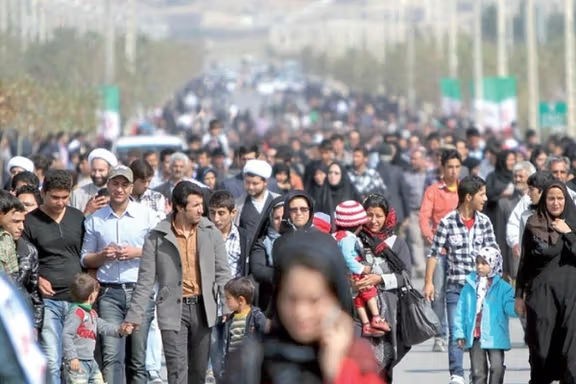Over 60% Of Iranians Want Transition From Islamic Republic

A new online survey by a Netherlands-based institute has found that over 60 percent of Iranians want regime change or "transition from the Islamic Republic".

A new online survey by a Netherlands-based institute has found that over 60 percent of Iranians want regime change or "transition from the Islamic Republic".
The survey by Gamaan found that 41% of respondents want the overthrow of the Islamic Republic and 21% prefer "structural changes and a transition from the Islamic Republic". On the other hand, only 18% of the respondents said they were happy with the political system and wanted to preserve the principles and values of the Islamic Revolution which overthrew the Shah of Iran and his Pahlavi Dynasty in 1979.
Gamaan focuses on measuring attitudes in Iran and they shared their latest findings with Persian-speaking media abroad on Friday. The institute has published their survey results also in English in the past.
Prince Reza Pahlavi who has lived all his adult life in exile was the most popular in a list of civil and political figures mentioned in the Gamaan survey with 39% of respondents choosing him over all others including the current rulers of the country.
Over 65% of respondents said they had a positive view of the Prince's grandfather Reza Shah Pahlavi (1878-1944) who founded the Pahlavi Dynasty, while 23% evaluated him negatively. His son Mohammad Reza Pahlavi (1919-1980) who was overthrown by the Islamic Revolution of 1979 was viewed positively by 64% of respondents, while 28% judged him negatively.
Prince Reza Pahlavi was followed by hardliner President Ebrahim Raisi with 17%, and former President Mahmoud Ahmadinejad with 12% of support. Former prime minister and presidential candidate Mir-Hossein Mousavi Mousavi who has been under house arrest since 2012, former reformist President Mohammad Khatami, and former moderate Foreign Minister Mohammad Javad Zarif were favored by less than 10% of the respondents.
Only 28% of respondents had a positive view of Ruhollah Khomeini (1902-1989), the founder of the Islamic Revolution, while 64% evaluated him negatively. According to Gamaan, his successor and the current supreme leader, Ali Khamenei, was favored by only 26% of the population while 66% judged him negatively.
The survey titled “Iranians’ Attitudes toward Political Systems” was carried out between February 17-27, 2022, with a final sample population of 16,850 literate Iranians aged above 19 who live inside Iran who make up 85% of the adult population.
When asked about their preferred regime type, 34% chose a “secular republic”, 22% the “Islamic republic”, 19% a “constitutional monarchy”, and 3% an “absolute monarchy”. Also, over 21% declared that they are “not sufficiently informed to answer this question”.
According to Gamaan, the results of the survey can be generalized to the target population with a credibility level of 95 percent. The survey employed multiple chain referral to select the sample population, but there has been no peer review yet of the methodology used in selecting the target audience.
Comparison with previous surveys reveals no drastic changes occurring over the past year, Gamaan said.
About 65% of respondents said they favored “nationwide strikes”, 65% “protest campaigns in social media”, 52% “engaging in civil disobedience” to bring about political change in the current milieu of Iran.
Iran witnessed several widespread protests during 2021, including protests over water shortage in Khuzestan and Esfahan while teachers, workers, nurses, and pensioners had to resort to recurring protests demanding improvement in their livelihoods. Security forces dispersed peaceful gatherings in most cases and even resorted to using lethal force in Khuzestan in July and in Esfahan in November.
The results of the survey showed that 88% of the population favor a "democratic political system” while 67% of the population are against “having a system governed by religious law”. Only 28% evaluate favored a religious governing system.